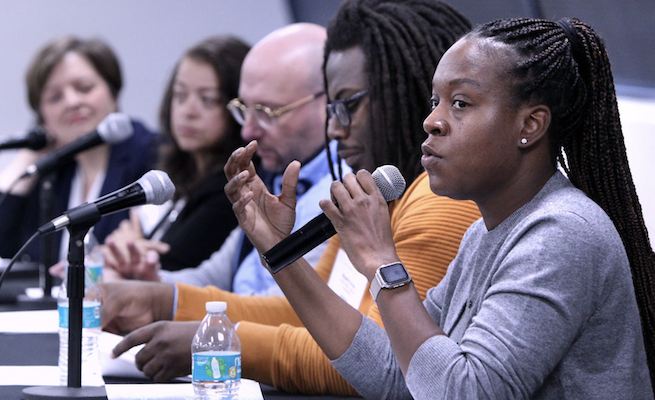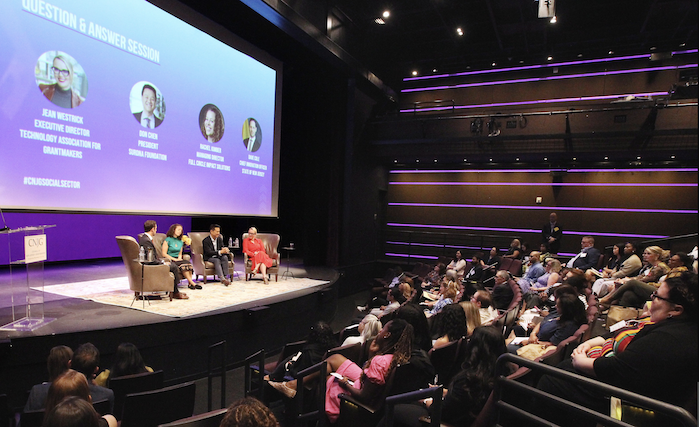Site Search
- resource provided by the Forum Network Knowledgebase.
Search Tip: Search with " " to find exact matches.
This report highlights three philanthropic efforts to build the capacity of local communities in the West - The Ford Family Foundation’s Ford Institute Leadership Program, the Northwest Area Foundation’s Horizons Program, and the Orton Family Foundation’s Heart and Soul Community Planning Program.
Native Voices Rising is a joint research and re-granting project of Native Americans in Philanthropy and Common Counsel Foundation. This report focuses on the practices and challenges of community organizing and advocacy, focusing on the need for increased investment in and sustained support for American Indian, Alaska Native and Native Hawaiian communities.
In this funder briefing, Christopher Miller, Environmental Law Center, will cover recent and anticipated changes impacting water and air quality, and environmental justice, and the need for legal advocacy at the state and local level. Additionally, Alison Mitchel and Barbara Blumenthal, New Jersey Conservation Foundation will discuss the impact of federal policy on land conservation, clean energy, and climate change issues.
Dr. Barbara Blumenthal is research director with the New Jersey Conservation Foundation, which advocates for cost-effective clean-energy policies to achieve deep decarbonization. Dr. Blumenthal collaborates with national experts to develop foundational policy strategies and regulatory approaches for New Jersey. Dr. Blumenthal also collaborates with a wide range of environmental, environmental justice and consumer advocates to analyze costs that inform the implementation of affordable and effective clean energy policies.
Chris Miller is an environmental lawyer and the executive director of Eastern Environmental Law Center, a 501(c)3 nonprofit law organization based in Newark, New Jersey. EELC partners with community groups and nonprofit organizations to advance equitable clean energy solutions, achieve environmental justice and defend our region's open space and natural resources from unsustainable development.
Alison Mitchell serves as the Executive Director of New Jersey Conservation Foundation, and has worked for New Jersey Conservation Foundation for over 30 years. Previously Assistant Director and Acting Development Director, Alison served as the Conservation Foundation’s Public Policy Director for over a decade. In earlier years, Alison also worked on land acquisition initiatives and led NJ Conservation’s Conservation Assistance Program, and played a leadership role in the organization’s farmland preservation efforts. In addition to her work at the Conservation Foundation, Alison was a founding trustee and former president of the Hunterdon Land Trust, and a member of the Board of Trustees of Isles. She also served as a public member appointed by Governor McGreevey on the Delaware and Raritan Canal Commission.
Cost: Free for CNJG Members; $75 for Non Member Grantmakers
This program is only open to staff and trustees from grantmaking organizations.
Programs in this Series:
March 13: Making Sense of Federal Policy: Understanding What it Means for NJ: Immigration
March 20: Making Sense of Federal Policy: Understanding What it Means for NJ: Health
March 27: Making Sense of Federal Policy: Understanding What it Means for NJ: Environment
April 3: Making Sense of Federal Policy: Understanding What it Means for NJ: Education
April 10: Making Sense of Federal Policy: Understanding What it Means for NJ: Housing
April 17: Making Sense of Federal Policy: Understanding What it Means for NJ: Media & Journalism
April 24: Making Sense of Federal Policy: Understanding What it Means for NJ: Arts
Webinar Video
Links
Report: Nature For All: A 2050 Vision for New Jersey
NJ Conservation Blueprint - data-driven, interactive mapping tool
How the government can partner with impact investors to unleash new capital, talent and energy for maximum impact.
Learn how to meet ongoing critical needs, support resiliency, and prepare for COVID-19 recovery.
COVID-19 is not your “typical” disaster. There are still many unknowns about the pandemic’s full impact and how long restrictions on business and nonprofit services will last. Unlike with storms and other weather events, response and recovery phases overlapping, and New Jersey could even face concurrent disasters during hurricane season.
In a departure from weather events and other natural disasters, the Center for Disaster Philanthropy now recommends “frontloading” funding for COVID-19 – putting all possible resources into immediate relief, rather than holding back -- and planning for one or more upticks in virus cases, and even a second wave. Additionally, CDP says, partnering with government will be more important than ever to fill gaps in need and reach the hardest hit communities. So far, philanthropy has been adaptive during the COVID-19 pandemic, responding rapidly to the urgent needs of new and existing grantee partners. But, where do we go from here?
Hear from Sally Ray, Director of Strategic Initiatives at the Center for Disaster Philanthropy and Keith Adams, Executive Director of New Jersey Voluntary Organizations Active in Disaster (VOAD).
Topics will include:
• Responding to pressing needs of food insecurity, housing, and job loss.
• Funding strategies to plan for additional upticks and support an equitable recovery.
• How the sector can build local organizations’ capacity to persevere through uncertainty and tackle the ever-growing demand for services.
Cost: Free for CNJG Members $50 for Non Member Grantmakers
Webinar Video
Six million immigrants in the US have jobs that could increase their risk of contracting the virus -- from physicians and home health aides to agriculture and food production workers. Another 6 million work in areas that have suffered major financial loss, including the restaurant and hospitality industry, in-home childcare, agriculture, and building services.
Yet, documented and undocumented immigrants are ineligible for federal relief funds and government-sponsored safety-net programs. Many “essential” workers lack health insurance. Language barriers often make getting services difficult. And, fear of repercussion if they test positive for COVID or uncertainty around immigrant policies prevent many immigrants from even seeking assistance.
During this webinar briefing, we will hear from Abel Rodriguez, Director for the Center on Immigration and Assistant Professor of Religion, Law, and Social Justice at Cabrini University and Sara Cullinane, Director of Make the Road New Jersey.
Topics will include:
• How immigrants and their families have been impacted by COVID, nationally and in our state.
• Supporting immigration policies and programs that advance the social and economic well-being of immigrant populations.
• Efforts in New Jersey communities to provide direct support, education, and other needed resources to immigrants during the pandemic.
Nearly 1 in 4 New Jersey residents is an immigrant. And despite their vital importance to this state and our country’s culture and economy, immigrants are often left out of programs and denied services that are critical for recovery. Join us for an important briefing on why your organization’s response to COVID must uplift immigrants and their families – now and for the future.
Cost: Free for CNJG Grantmakers. $50 for Non Member Grantmakers
Webinar Video
Dear CNJG Community,
I am writing to let you know that last week Council of New Jersey Grantmakers’ President and CEO Nina Stack, notified the Council’s Board of Trustees that she will be stepping down in June to become the Executive Director of The Champlin Foundation, the largest private foundation in the state of Rhode Island.
This is certainly bittersweet news. While we will miss her tremendous leadership, enthusiasm, and good spirit she has brought to our state’s philanthropic community these past thirteen years, anyone who knows Nina knows that Rhode Island is also near and dear to her heart.
Yesterday, I convened a meeting of our Executive Committee, which includes Bill Engel/Hyde & Watson Foundation, Annmarie Puleio/Fred C. Rummel Foundation, Cynthia Evans/Geraldine R. Dodge Foundation, and Bill Leavens/Leavens Family Foundation to consider how the Council will address this transition phase and search process.
In addition, the full Board of Trustees will be meeting later this month to build on these initial conversations. We are developing a thorough, thoughtful, and deliberate transition plan and search process. I will be back in touch with all of you, the members of CNJG and colleagues, in the coming weeks to share those details.
The good news is that under Nina’s extraordinary leadership over these many years, the Council is in an excellent position. Our finances are very strong, our membership continues to grow, our members are more engaged, our programming is exceptional, our partnerships are robust, our staff is talented, and our influence with policymakers, business leaders, and others across the state deepens.
In the meantime, Nina will remain on staff until June 1. We look forward to seeing many of you at the Spring Colloquium – Breaking Through in the New Media Paradigm – on May 24.
Please join us for what will be Nina’s last program as President and CEO of the Council, I encourage you to register as soon as possible. Seating is limited, and I have no doubt it will sell out very soon.
Sincerely,
Jonathan Pearson
Chair, Council of New Jersey Grantmakers
Related Articles
Providence Business Journal: Stack to head Champlin Foundation come June
Join the Robert Wood Johnson Foundation (RWJF) for a discussion on health and racial equity in New Jersey and how to achieve it. The roundtable discussion will focus on exploring strategies to advance health equity goals across a number of key areas, some of which are those identified in A Policy Agenda for a Healthier, More Equitable New Jersey, which RWJF released earlier this year.
Speakers include:
Maisha Simmons, Robert Wood Johnson Foundation
Atiya Weiss, The Burke Foundation
Sharnita Johnson, Victoria Foundation
Marianna Schaffer, Geraldine R. Dodge Foundation
Alana Vega, The Fund for New Jersey
There will be time for Q & A following the roundtable.
Cost: Free for CNJG Members
Resources:
A Policy Agenda for a Healthier, More Equitable New Jersey
New Jersey Reparations Council
New Jersey Birth Equity Funders Alliance
Neighbors Helping Neighborhoods
New Jersey's Public Health Institute: Advancing Health Equity in New Jersey
Organizing Examples: Make the Road and Wind of the Spirit
The Future of Work and the Role of Philanthropy
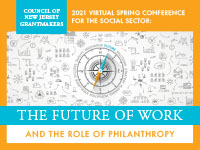
Dates: Wednesday, May 19 and Thursday, May 20
Time: 2:00 to 5:00 p.m.
One of the most valuable learning and networking events for the social sector in the state, CNJG’s 2021 Virtual Spring Conference considered the role of philanthropy in shaping how, where, and why we work.
The coronavirus pandemic has impacted and propelled the future of work in ways we couldn’t have imagined. But even before the pandemic - the automation of jobs, the gig economy, the ongoing need for reskilling and retraining, changing demographics, green careers, lack of job security and more – has been setting the stage for novel ways of working. The Spring Conference explored this new, accelerated work paradigm, it’s profound impact on New Jersey’s industries, workers and communities, and the implications for grantmakers and their nonprofit partners.
This timely and important event brought together national and local thought leaders, experts and stakeholders to share what the social sector can do to ensure a better future for New Jersey’s workforce. Attendees engaged in candid, visionary conversations around equitable labor standards and professional practices, the changing, post-pandemic workplace, strategies to fill gaps in skills, education, and opportunity, the effects of new federal job policies on workers, and much more.
Thank you for joining the Council of New Jersey Grantmakers for an exploration about what lies ahead as we prepare for and address pressing and unprecedented changes in the world of work.
Only people who registered for the Conference will be able to access WHOVA. For assistance or additional information, please contact Anna D’Elia, Manager of Programs and Learning.
70 years after Brown vs. The Board of Education, segregation and resource inequities continue in New Jersey schools. Discussion will center on the lawsuit brought by 9 families with a coalition of civil rights, faith, and social justice groups. Meet Dr. Charles Payne, Director, The Cornwall Center for Metropolitan Studies Rutgers; Dr. Jesselly De La Cruz of Latino Action Network Foundation; Vivian Fraser of Urban League of Essex County; Jared Hunter with Salvation and Social Justice; and Brandon McKoy of The Fund for New Jersey.
New Jersey boasts one of the top education systems in the U.S. but our public schools are also among the nation’s top 6 or 7 most segregated. We see substantial differences in resources afforded across our 620 districts aligned with home rule. This results in significant harm in outcomes for students in segregated districts, including the 63% of all Black and Latino students who attend schools segregated by race and poverty.
Panelists: Dr. Jeselly De La Cruz, Executive Director at Latino Action Network Foundation; Vivian Cox Fraser, CEO of Urban League of Essex County; Dr. Charles Payne, Director, The Cornwall Center for Metropolitan Studies, Rutgers University; Jared Hunter, Organizing Director with Salvation and Social Justice; Brandon McKoy, President, The Fund for New Jersey
Cost: Free for CNJG Members, $50 for Non Member Grantmakers.
Webinar Video
Cornwall Research Finding Summary: The Latinx Experience in NJ Schools: A Preliminary Overview
Dr. De La Cruz referenced article from Chalkbeat: New Jersey school segregation case: A look at key points, what’s next in Latino Action Network vs. NJ
Inspiring Change through Leadership: Maximizing Philanthropic Impact
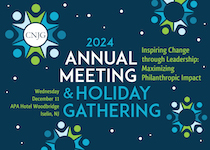 Wednesday, December 11, 2024 - 9:00am to 3:00pm
Wednesday, December 11, 2024 - 9:00am to 3:00pm
Luncheon, Keynote Presentation & Workshop
Location: APA Hotel Woodbridge, 120 Wood Ave S, Iselin, NJ 08830
The Council of New Jersey Grantmakers thanks everyone who attended our 2024 Annual Meeting & Holiday Gathering. On Wednesday, December 11, over 130 Council members and special guests gathered to celebrate the holiday season, welcome new CNJG members, convene our annual business meeting, and feature a dynamic discussion related to the vital work of philanthropy.
The Council’s 2024 Annual Meeting & Holiday Gathering was the place where CNJG members and New Jersey’s philanthropic community came together to share ideas about the important work they’re doing. It also provided a valuable opportunity to connect with colleagues.
This year’s theme, Inspiring Change through Leadership: Maximizing Philanthropic Impact, featured keynote speaker Amalia Brindis Delgado of the Panta Rhea Foundation.
The Annual Meeting included a workshop that explored the New Jersey Principles for Philanthropy. An overview of the Principles was presented, followed by a panel of fellow CNJG members who discussed how they are already using the Principles within their organizations. Attendees also had time to discuss how they could leverage the New Jersey Principles for Philanthropy to make changes within their own organizations.
Annual Meeting Photos
Empowering the Future: Harnessing AI and Data for Philanthropic Social Impact
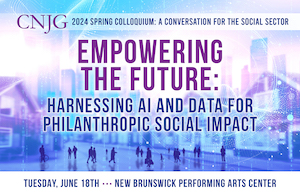
Date: Tuesday, June 18
Time: 9:30 a.m. to 3:30 p.m.
Location
New Brunswick Performing Arts Center
Arthur Laurents Theater
11 Livingston Ave, New Brunswick, NJ 08901
Directions and Parking
On Tuesday, June 18, 2024, the Council of New Jersey Grantmakers held the Spring Colloquium – A Conversation on the Social Sector at the New Brunswick Performing Arts center. This year, we explored the impact of AI and data on philanthropy and the nonprofit sector. Our panel discussion will brought together multiple perspectives to explore how AI can enhance problem-solving without losing human connections, how it affects equity, and how philanthropy has engaged with AI for funding initiatives.
The Technology Association of Grantmakers’ new Executive Director, Jean Westrick, moderated our esteemed panel that included Don Chen, President, Surdna Foundation; Rachel Kimber, Full Circle Solutions; and Dave Cole, State pf New Jersey’s Chief Innovation Officer.
After the panel, Jean Westrick, TAG, facilitated an afternoon session on an AI Framework for Philanthropy. Additionally, the Community Resource Exchange presented an afternoon session on an AI Guide for Nonprofits facilitated by their CEO, Tiloma Jayasinghe, CEO and Jared Carroll, Senior Consultant.
CNJG’s spring colloquium brought together New Jersey grantmakers and nonprofits to connect with each other, Increase their knowledge, learn best practices, find opportunities for collaboration, and to be introduced to new ideas.
Conference Photos
This session will unpack New Jersey’s just-enacted Fiscal Year 2026 state budget—totaling $58.1 billion—with a $6.3 billion surplus. We’ll explore key spending priorities, looming threats from federal funding cuts, and the implications for the transition to the next governor.
Peter Chen, Esq. (he/him), Senior Policy Analyst at New Jersey Policy Perspective, serves as tax and budget lead, coordinating analysis of state and local fiscal policy. Peter has worked on child and family policy advocacy in New Jersey since 2014. Most recently, he spearheaded New Jersey’s creation of a state-level Child Tax Credit. Peter’s work has included coordination of the statewide nonprofit Census complete count campaign, advocacy to strengthen state and local laws to protect children from lead exposure, and reducing chronic absenteeism from school. Previously Peter served as Policy Counsel for Advocates for Children of New Jersey. Peter received his JD from Yale Law School and his Bachelors of Arts from Indiana University-Bloomington.
Tina M. Zappile is the Director of the William J. Hughes Center for Public Policy at Stockton University where she is also Associate Professor of Political Science. She earned her Ph.D. in International Relations and M.A. in International Trade and Finance from the University of Nebraska-Lincoln, and her M.A. in Political Science and B.A. from the University of Nevada, Las Vegas. Her research interests include international organizations (IOs), international law, international trade and finance, the North-South divide, global economic development policy, and the role of developing countries in IOs and the global economy. She teaches classes in international law and organization, global politics of economic development, introduction to international relations, and international political economy.
Cost: Free for CNJG Members; $75 for Non Member Grantmakers
This program is only open to staff and trustees from grantmaking organizations.
Webinar Video
Join this virtual session introducing systems thinking principles and their vital role in driving meaningful change. Whether you're a seasoned professional or new to the field, this session will equip you with the knowledge to unlock transformative solutions for your organization and community.
The webinar will explore—and show participants how to apply—a systems change framework that adapts and expands the approach forged by New Jersey grantmaker, The Nicholson Foundation. This approach embodied collaboration with government, foundations, and community nonprofits to promote sustainable change in New Jersey. State leaders in government, nonprofits, and philanthropy will reflect on how they use systems thinking principles in New Jersey and their crucial role in getting to outcomes in health and early childhood education using community-based approaches. In addition to a deep dive on systems change in New Jersey, participants will gain insights from foundation leaders in Texas who are transforming complex systems, including education and behavioral health.
Key Takeaways
· Understand the Systems Change Framework: Analyze the systems affecting your work.
· Practical Tools: Acquire actionable insights to implement complex change.
· Interactive Learning: Engage in discussions, expert presentations, and real-world reflections.
Moderator and Panelists Focused on New Jersey
Kimberly Boller, PhD, former Executive Director of The Nicholson Foundation and CNJG Board member
Denise Anderson, PhD, Inaugural Executive Director of The Center for Health Equity & Wellbeing, New Jersey's Public Health Institute; and former Managing Director for the Office of Primary Care and Rural Health at the New Jersey Department of Health
Wendy McWeeney, MPA, Co-Director, Community Health Acceleration Partnership
Atiya Weiss, MPH, Executive Director of the Burke Foundation and former CNJG Board member
The Nicholson Foundation is sponsoring the webinar in partnership with the Center for Nonprofits & Philanthropy at Texas A&M University’s Bush School of Government and Public Service.
Cost: $99. Please register by May 12.
Contact Kimberly Boller with questions and requests for group pricing.
You don’t need to be a technologist to understand that Artificial Intelligence (AI) is changing our world, including philanthropy and the nonprofit sector.
As you attend next month’s CNJG 2024 Spring Colloquium – A Conversation for the Social Sector on June 18, consider what philanthropy does best as the conversation unfolds. Philanthropy takes risks. Philanthropy tests new ideas and concepts, that can then be scaled. Philanthropy drives experimentation. Philanthropy convenes thought leaders, practitioners, and community voices, to engage in full and deliberate conversations.
We’re excited to welcome Jean Westrick, Executive Director of the Technology Association of Grantmakers (TAG), to moderate the morning panel session. TAG and Project Evident recently released their Responsible AI Adoption in Philanthropy framework to help grantmakers adopt AI in a manner that aligns with their mission. Jean will help us dig deeper into the framework during an afternoon session. Not only does the framework provide practical guidance, it is a clarion call for philanthropy to play a crucial role in advancing the responsible use of AI for nonprofit enablement.
Understanding this seminal role, last year, ten major foundations announced a $200 million investment to ensure AI advances the public interest. The investment is centered around five areas of need including: ensuring AI advancements protect democracy and the rights and freedoms of all people, empowering workers to “thrive amid AI-driven changes,” and supporting the development of AI international norms and rules.
Colloquium panelist Don Chen, President and CEO of the Surdna Foundation, recently spoke at the Partnership for AI’s 2024 Philanthropy Forum. There he discussed the importance of working with partners to make investments in responsible infrastructure. He expanded on these ideas, encouraging ongoing AI conversations to be reparative and healing, especially for racial equity and justice.
Governor Murphy created the New Jersey State Office of Innovation in 2018 to "improve the lives of New Jerseyans by solving public problems differently.” Colloquium panelist Dave Cole, Chief Innovation Officer, in a recent StateScoop Priorities Podcast, shared his commitment to solving problems for NJ residents using human-centered design and leveraging AI to improve services. The practical and pragmatic conversations about AI are central to philanthropy’s role in harnessing technology for good.
Our third panelist, Rachel Kimber, joined fellow social sector leaders in calling for philanthropy to move forward with “responsible AI development and adoption.” Published by the Center for Effective Philanthropy, the blog Responsible AI: How Philanthropy Can (and Should) Support the Movement outlines four critical concepts for philanthropy: drive sector-level vision, fund the back-end, develop guidelines, and invest in equitable innovations.
I encourage you to review the resources we’re gathering on the Colloquium web area to further inform your thinking.
While AI and analytical technologies are revolutionary tools reshaping industries, as Vilas Dhar, Patrick J. McGovern Foundation, said in an interview with the Chronicle of Philanthropyrecently, “These conversations are very rarely actually about technology.” In the article, How A.I. Could Solve Humanity’s Biggest Problems — If Philanthropy Catches Up, Dhar implores philanthropy to look closely at how AI is changing our world and challenges us to examine how philanthropy must change. Indeed, philanthropy has several roles to play, including fueling the big picture and visionary conversations, and helping to drill down on the more practical applications of AI for grantmakers and nonprofits in support of a just and equitable world.
Join us at the CNJG 2024 Spring Colloquium: A Conversation for the Social Sector - Empowering the Future: Harnessing AI and Data for Philanthropic Social Impact on Tuesday, June 18, to engage in these big, bold, and transformative conversations.
We look forward to seeing you there!
Sincerely,
Theresa Jacks, President and CEO
Council of New Jersey Grantmakers
Already, 2025 has been a year unlike any other. The changes in federal policy are coming at a pace we’ve not experienced before. Not even a month in, the new administration immediately issued several significant Executive Orders (EOs), creating uncertainty across the social sector. From attempts to freeze Congressionally approved funding, to efforts banning diversity, equity, and inclusion programs, and questionable tactics to slash the federal workforce; funders and nonprofit partners are gravely concerned about how the fabric of our democracy and the systems of constitutionally mandated checks and balances are fraying right before our eyes. To help you cut through the noise, the National Council of Nonprofits is tracking and continuously updating its analysis of the impact of these EOs on nonprofit organizations in real time.
This is the time to shore up relationships with colleagues and nonprofit partners. I’m grateful that in New Jersey, we have a strong partnership with the New Jersey Center for Nonprofits. Advocacy and policy are at the heart of the Center’s mission. They have been at the forefront of keeping us informed about the Office of Mangement and Budget's (OMB) freezing of federal grants and loans. I encourage you to:
- Sign up for the Center’s email list for up-to-date, reliable information.
- Ask your grantees and nonprofit partners to complete the annual NJ Trends and Outlook survey, launched today. This year, the survey is also collecting stories about how executive actions are impacting nonprofit organizations.
On behalf of philanthropy-supporting organizations, United Philanthropy Forum is also mobilizing to serve as a key source for accurate, reliable information with their newly created resource page, “Executive Actions Impacting the Philanthropic & Nonprofit Sectors."
Funders across the country are asking what they can do immediately. As I noted above, leveraging your partnerships and strengthening your relationships is key. Echoing sage recommendations from the Council on Foundations and Grantmakers for Effective Organizations, here are other strategies for your consideration:
- Reach out to your grantees and nonprofit partners – don’t wait for them to reach out to you. They need to hear from you and know that you are championing their often-thankless work.
- Offer flexible funding and move funding quickly. Allow your grantees to repurpose their current grant funding to meet the needs of their organization and those they serve. Giving nonprofits every resource and tool they need to be nimble is critical.
- Share your funding opportunities with the New Jersey Center for Nonprofits to post on their revamped funding page.
- Get comfortable introducing your grantees to new partners, other grantees, and potential funders. This is how we build strong, resilient communities of practice and service.
We’re embarking upon untested times. As we celebrate Black History Month and Women’s History in March, it is important to remember that meaningful change starts and ends with partnership, collaboration, and advocacy. Philanthropy has a critical role to play in this equation.
To help you better understand the federal policy landscape, we’re hosting an eight-part Funder Briefing Series: Making Sense of Federal Policy: Understanding What it Means for
New Jersey, beginning in March. This series will provide an overview of key issues that directly impact philanthropy, and more broadly, the charitable sector. The first session, on March 13 at 4:00 pm., will focus on immigration.
In addition, we will be launching a web page with information and resources to help inform your decision-making, as well as reintroducing our policy infused e-newsletter, CNJG ...for the field. Covering both big 'P' and little 'p' policy issues, the first edition will land in your inbox later this month, providing key updates and relevant articles.
I want to end with some exciting news — Craig Weinrich has been promoted to Senior Director, Member Experience. Craig has been with CNJG for 11 years, and his leadership and dedication have been invaluable to our community. Please join us in congratulating him on this well-deserved promotion!
promoted to Senior Director, Member Experience. Craig has been with CNJG for 11 years, and his leadership and dedication have been invaluable to our community. Please join us in congratulating him on this well-deserved promotion!
And channeling Craig – a quick reminder: it’s time to renew your CNJG membership. Please reach out to him if you have questions.
We look forward to engaging with you in the months ahead. Philanthropy has an important role during these tenuous times. Let’s use our collective power for good.
In solidarity,
Theresa Jacks, President and CEO
Council of New Jersey Grantmakers
A CNJG member queried the corporate listserve on strategies or resources for virtual volunteering. CNJG compiled these responses, and listed the different opportunities that members are offering for employee volunteerism.
A CNJG member queried the Health & Aging listserves asking for sample letters of inquiry. This document includes a few responses from fellow members. If you would like to add yours to this list, please email us.
Strategic asset allocation is arguably one of the most important, yet least advanced, aspects of investing. The Investment Strategy Group (ISG) in the Goldman Sachs Investment Management Division has developed a new approach to strategic asset allocation, which leverages the idea that long-term investment returns derive from multiple distinct sources called “return-generating factors.” This multi-factor approach is designed to help investors better understand the key sources of long-term return across asset classes and to increase the precision of long-term risk and return estimates. It also provides investors with a new way to think about portfolio diversification, allowing them to focus not only on diversification across asset classes but also
on diversification across the underlying sources of return.

